Garlic: Nature's Protector
Garlic, a common kitchen ingredient, possesses remarkable properties that benefit cardiovascular health. It can help reduce plaque buildup in arteries.
Garlic achieves this by preventing cholesterol from accumulating on artery walls, reducing the risk of blockages. Additionally, it helps relax blood vessels, thus improving blood flow and reducing blood pressure. Regular consumption of garlic has been associated with a lower incidence of heart disease. Consider adding fresh garlic to your meals, such as stir-fries, soups, and salads. For those who dislike the taste, garlic supplements are also available, though it's always best to consult with a healthcare professional regarding dosage and compatibility with other medications.
Fatty Fish: Omega-3 Power
Fatty fish, such as salmon, mackerel, and sardines, are rich in omega-3 fatty acids, which are crucial for heart health. Omega-3s possess anti-inflammatory properties that help reduce arterial inflammation, a key factor in the development of blockages. They also lower triglyceride levels, which can contribute to the formation of plaque. Furthermore, omega-3s can improve the function of the endothelium, the lining of blood vessels, leading to better blood flow. It is recommended to include fatty fish in your diet at least twice a week. You can grill, bake, or pan-fry them with herbs and spices for flavor, adding a nutritious and tasty element to your meals. If you are not a fan of fish, consider taking an omega-3 supplement, after discussing it with your doctor.
Olive Oil: Heart-Healthy Choice
Olive oil, particularly extra virgin olive oil, is a staple of the Mediterranean diet and is known for its heart-healthy benefits. It is rich in monounsaturated fats, which help reduce levels of harmful LDL cholesterol while increasing beneficial HDL cholesterol. This can prevent plaque buildup in arteries and improve overall heart health. Olive oil also contains antioxidants, which help protect blood vessels from damage caused by free radicals. Use olive oil in your cooking for sautéing vegetables, drizzling over salads, or as a finishing touch to many dishes. When choosing olive oil, opt for extra virgin olive oil, as it contains the highest levels of beneficial nutrients. Remember to use olive oil in moderation, as it is high in calories.
Berries: Antioxidant Boost
Berries, including blueberries, strawberries, and raspberries, are packed with antioxidants, which play a crucial role in maintaining heart health. These antioxidants combat oxidative stress and inflammation in the body. They prevent damage to blood vessels, which can lead to the formation of plaques. Berries also improve the function of blood vessels, promoting healthy blood flow. They are low in calories and high in fiber, which can help lower cholesterol levels. Enjoy berries as a snack, add them to your breakfast cereal or yogurt, or blend them into smoothies. Incorporating a variety of berries into your daily diet can provide a delicious and healthy way to support your heart health.
Avocados: Healthy Fats
Avocados are rich in monounsaturated fats and are excellent for heart health. They can help lower LDL cholesterol levels and raise HDL cholesterol levels. This balance in cholesterol profiles is vital for preventing plaque buildup in the arteries. Avocados contain antioxidants, which help protect blood vessels from damage. They are also a good source of potassium, which helps regulate blood pressure. Add avocados to your salads, sandwiches, or smoothies. You can also mash them and use them as a spread instead of butter or mayonnaise. Be mindful of portion sizes, as avocados are calorie-dense. Including avocados as part of a balanced diet can provide numerous benefits for heart health.



















